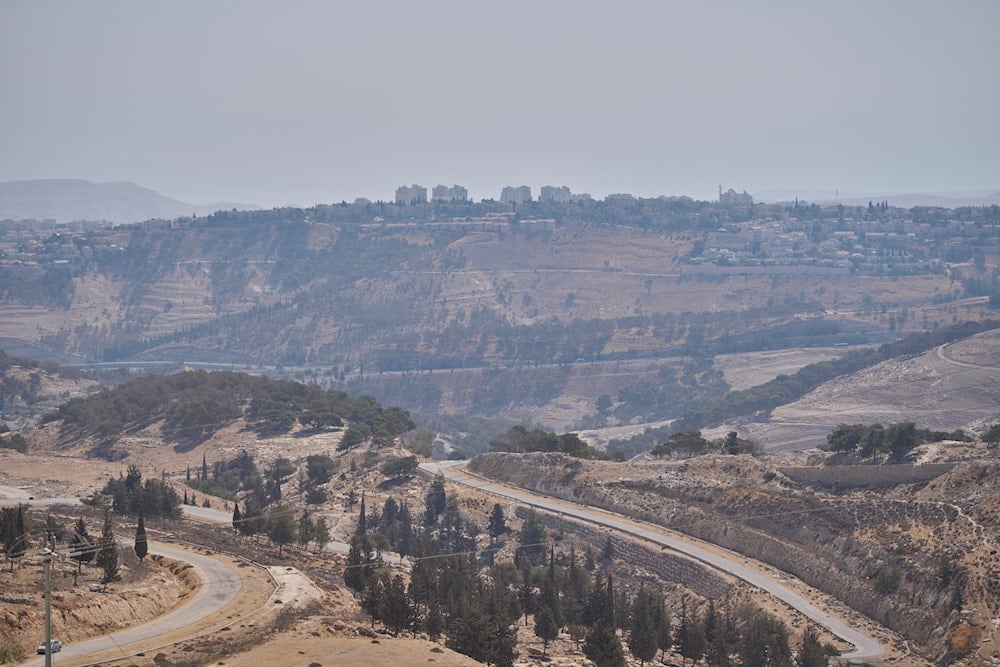Israeli roads in West Bank trap Palestinians as settlements expand
As Trump promotes his Gaza plan, Palestinians in the West Bank endure raids, arrests, killings, and expanding settlements that deepen mistrust of US promises.
-

View of an area near Maale Adumim, an Israeli settlement in the occupied West Bank, near where the Israeli government says more outposts will be built as part of the E1 settlement project, Thursday, Aug. 21, 2025 (AP)
As US President Donald Trump this week announced what he claimed was a plan to end the war on Gaza and raised the prospect of a future Palestinian state, Palestinians in the occupied West Bank were witnessing a very different reality, Reuters reported.
In Beit Ur al-Fauqa, Palestinians saw Israeli bulldozers escorted by armed guards cutting through the surrounding land to pave new roads for Israeli settlements, routes that locals say will further restrict Palestinian movement and deepen their isolation.
“This is to prevent the residents from reaching and using this land,” said Ashraf Samara, a member of the village council. The new roads, he added, would effectively “trap the villages and the residential communities” by fencing Palestinians into their immediate areas.
Each new road makes travel easier for settlers but harder for Palestinians, who are largely barred from using such routes. Villagers face mounting obstacles in reaching workplaces, nearby towns, or even their farmland.
Recognition abroad, expansion on the ground
The construction comes as several major European nations, including Britain and France, recently joined a growing list of states formally recognizing Palestinian statehood. Yet on the ground, settlement expansion in the West Bank has accelerated under Israeli Prime Minister Benjamin Netanyahu’s government while the genocide in Gaza drags on.
Palestinians and most of the international community regard the settlements as illegal under international law.
Hagit Ofran, an activist with the Israeli group Peace Now, said the new network of roads near Beit Ur al-Fauqa was part of a broader strategy. “They are doing it in order to set facts on the ground. As much as they have the power, they will spend the money,” she said, noting that "Israel" has earmarked seven billion shekels ($2.11 billion) for West Bank roadbuilding since October 2023.
The settlement infrastructure, roads, bypasses, and other links occupied by "Israel" have steadily extended since Palestine was occupied in the June 1967 war. In a 2004 report, Israeli rights group B’Tselem described this system as “Israel’s Discriminatory Road Regime,” arguing it was designed to restrict Palestinian urban development.
Wider context
Netanyahu himself has openly rejected the idea of Palestinian sovereignty. Just weeks before Trump announced his Gaza plan, the Israeli prime minister said, “There will never be a Palestinian state,” while approving settlement expansion between Maale Adumim and the occupied al-Quds.
His finance minister, Bezalel Smotrich, was even blunter, declaring that the project would “bury” the prospect of statehood.
Trump’s proposal, which Netanyahu endorsed, includes a roadmap toward Palestinian statehood, but analysts note that the conditions attached make such an outcome highly uncertain.
For activists like Ofran, the intent is clear. “What the government is now doing is setting the infrastructure for the million settlers that they want to attract to the West Bank,” she said. “Without roads, they cannot do it. If you have a road, eventually, almost naturally, the settlers will come.”

 3 Min Read
3 Min Read








